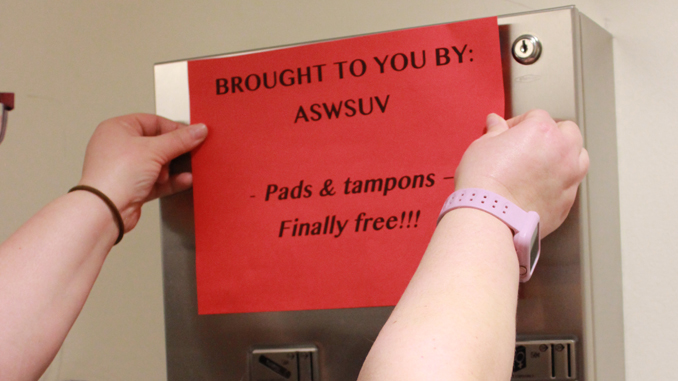
The Firstenburg Student Commons bathroom recently began providing free pads and tampons to to those who need them. A coin- operated dispenser in the women’s bathroom had the payment featured disabled to allow access to products on a as-needed basis.
Not everyone tracks the start of their menstrual cycle, but having access to tampons and pads in case of an emergency is a necessity. To get a pad or tampon in the bathroom in most institutions, the user would need loose change to purchase one, or would be forced to use wadded-up toilet paper until they’re able to find a friend, head home, or go somewhere to purchase one.
Student Senator and External Affairs Chair Holly Varner, first heard student concerns about the inconvenience of buying menstrual products in the bathrooms. This idea was later brought to Student Senator and Campus Affairs Chair Sean Slowik, who reached out to the senate in Pullman on a similar initiative.
Vice Chancellor for Finance and Operations Lynn Valenter, was asked to speak at one of the ASWSUV meetings on the topic of funding free menstrual products where she explained the use of state funding is very restricted. State funding is used for “goods and services which are necessary for completion of official university duties.”
Some state funding is allocated to maintenance and operations, which keeps the university’s buildings clean and fully operational. This includes lights and power, custodial services, maintenance, and cleaning supplies. This is where funding for toilet paper would come from. Everyone needs toilet paper, but only half of the student population needs menstrual products.
The Services and Activities fees paid by all students in addition to tuition do not have the same restrictions as state funding. According to Slowick, ASWSUV Senate is paying to provide the products for free using S&A fees. It costs $70 for 200 tampons and200pads.Slowickconfirmedthere are plans to expand this to all student bathrooms. He said the biggest hurdle is getting Facility Operations assist because the initiative would require them to restock the dispensers.
Currently, the Student Health and Wellness Center also supplies pads, tampons, dental dams, condoms, cough drops, and other health or hygiene related products for free. Their budget compromises both state funding and S&A fees. The state funding goes towards the Wellness and Access centers, and the S&A fees are used for counseling and the medical clinic. All free health and hygiene products provided are purchased with leftover S&A funding.
For additional information on the effort to stock pads and tampons in campus bathrooms, contact Sean Slowick at sean.slowick@wsu.edu
